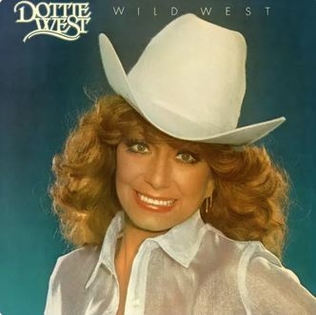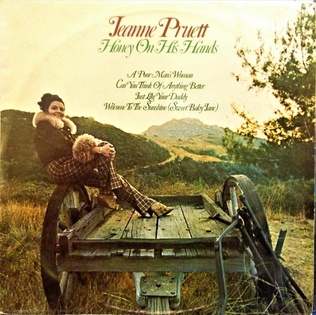
Jean Shepard was an American country singer who was considered by many writers and authors to be one of the genre's first significant female artists. Her early successes during the 1950s decade were said to influence the future careers of Loretta Lynn, Dolly Parton and Tammy Wynette.

Wild West is a studio album by American country artist Dottie West. It was released by Liberty Records in February 1981. It was one of several albums that were part of West's commercial resurgence in the late 1970s and early 1980s. On the album were three singles: the chart-topping "Are You Happy?" and "What Are We Doin' in Love". The album itself was among West's highest-peaking, reaching the top five of the US country albums chart. It was met with favorable reviews from several music publications.

The discography of American country singer Jean Shepard contains 29 studio albums, 12 compilation albums, two live albums, 1 box set album, 72 lead and collaborative singles, four promotional singles, two other charted songs and nine album appearances. Her first singles were released by Capitol Records in 1953, beginning with "Crying Steel Guitar Waltz". Her next two releases featured vocals by Shepard and a recitation by Ferlin Husky. The first was "A Dear John Letter", Shepard's only number one single on the US Hot Country Songs chart. It also reached number four on the US pop chart and number three in Australia. The second was "Forgive Me, John", which reached the US country top five, the US pop top 30 and the Australia top 20. In 1955, her solo singles "A Satisfied Mind" and "Beautiful Lies" both reached number four on the US Hot Country Songs chart. Their B-sides also charted on the US country chart: "Take Possession" and "I Thought of You". The latter peaked in the US country top ten.

"Slippin' Away" is a song written by American singer-songwriter Bill Anderson and was originally recorded by American country singer Jean Shepard. Inspired to write the song while watching an old film, Shepard chose to the song to record and it was released as her first single for the United Artists label in 1973. It became her first top ten US country song in several years and was issued on an album of the same name.
"The Tip of My Fingers", also titled "The Tips of My Fingers", is a song written and originally recorded by American country music singer Bill Anderson. First included on his 1962 album Bill Anderson Sings Country Heart Songs, the song was a Top Ten country single for him in 1960.

"Then He Touched Me" is a song originally recorded by American country singer Jean Shepard. Written by George Richey and Norro Wilson, it reached the top ten of the US country chart and was nominated by the Grammy Awards. It was Shepard's ninth top ten single in her career and was included on her 1970 album A Woman's Hand.

"At the Time" is a song written by Bill Anderson that was recorded by American country singer Jean Shepard. Released as a single by United Artists Records, it reached the top 20 of the US country chart in 1974. It was the second single written by Anderson that Shepard recorded. It was given positive reviews from magazines and books following its release.

"I'll Do Anything It Takes (To Stay with You)" is a single by American country music artist Jean Shepard written by Curly Putman, Larry Butler and Jan Crutchfield. Released in May 1974, it was the second single from the album I'll Do Anything It Takes. The song reached number 17 on the Billboard Hot Country Singles chart and was given reviews by publications in the years that followed.

The singles discography of American country artist, George Jones, contains 182 singles. Of the total, 136 were released with Jones as the solo artist. In addition, 31 were issued with Jones being part of a collaboration. Thirdly, eight singles were issued with Jones being part of a featured act. Fourthly, seven released were promotional singles. Additionally, 14 songs that are not released as singles are included that made any major chart. Finally, 21 music videos which were first issued as singles are also listed. Jones had his first chart success in 1955 with several top ten Billboard Hot Country Songs singles: "Why Baby Why", "What Am I Worth" and "You Gotta Be My Baby". After several more top ten releases, "White Lightning" became his first to top the Billboard country chart. Along with "Who Shot Sam", both singles were also his first to make the Hot 100 charts.

Honey on His Hands is a studio album by American country music artist Jeanne Pruett. It was released in June 1975 on MCA Records and was produced by Walter Haynes. The album was Pruett's fourth studio release and contained ten tracks previously not released. It would also be her final album release with the MCA label. Honey on His Hands spawned four singles that charted on the Billboard country survey.

Live from London is a live album by American country singer-songwriter Bill Anderson. It was released in October 1975 via MCA Records and was produced by Peter Robinson. The record was Anderson's first live album and included over ten tracks. It was recorded in the United Kingdom and was released in the country as well. Anderson would record several more live projects during the course of his music career.

"Midnight Angel" is a song written by Bill Anthony and Bob Morrison, recorded by American country music artist Barbara Mandrell. It was released in November 1976 as the first single and title track from the album Midnight Angel. It reached the top 20 of the American country songs chart.

The singles discography of American country artist Bobby Bare contains 96 singles. Of these, 80 are singles released as a lead artist, eight as a collaborative artist, three as a featured artist and five were released solely to Germany. Bare's first single to chart was 1958's "The All-American Boy", which reached number two on the American Billboard Hot 100 and number nine on the Australian Kent pop chart. Bare's singles would not receive more commercial success until he signed with RCA Victor. In 1962, his single "Shame on Me" charted on both the Billboard Hot 100 and the Hot Country Songs charts. The following year, Bare's pair of singles reached major chart positions on the Billboard Hot 100 and Country Songs charts: "Detroit City" and "500 Miles Away from Home". Both singles were his first to chart in the top ten of the country chart. RCA followed it in 1964 with the top ten singles "Miller's Cave" and "Four Strong Winds".
"Put It Off Until Tomorrow" is a song written by Dolly Parton and Bill Owens, and first recorded by American country music artist Bill Phillips. It was released in January 1966, and Phillips released an album of the same name later that year. The song became his biggest hit, peaking at number 6 on the Billboard Hot Country Singles chart. Parton provided uncredited harmony vocals on the single. The song has been covered by numerous artists, and became a top ten hit for The Kendalls in 1980.
"Come on Phone" is a song originally recorded by American country singer Jean Shepard. Released as a single in 1973, it reached the top 40 of the US and Canadian country songs charts. It was the second single spawned from her 1973 album Slippin' Away. It received positive reviews from music magazines following its release.

Slippin' Away is a studio album by American country singer Jean Shepard. It was released by United Artists Records in September 1973 and was her twentieth studio album. The album was named for Shepard's top five US and Canadian country single of the same name. The album itself was Shepard's first for United Artists after many years with Capitol Records. It received a positive response from both Billboard and Record World magazines.

I'll Do Anything It Takes is a studio album by American country singer Jean Shepard. It was released in July 1974 by United Artists Records and was her twenty first studio album. The album was a collection of 11 tracks, which featured subjects about romance and devotion. It was reviewed by various music publications following its release, including AllMusic, which rated it three out of five stars. Two singles were included on the album that reached the US country songs top 20: the title track and "At the Time".

Poor Sweet Baby...And Ten More Bill Anderson Songs is a studio album by American country singer Jean Shepard. It was released by United Artists Records in March 1975 and was her twenty-second studio album. The disc was a collection of songs that paid tribute to singer-songwriter Bill Anderson. It included some re-released Anderson-penned tracks that appeared on previous Jean Shepard albums, along with covers of songs Anderson had composed over the years. It received reviews from music publications following its release and made the US country albums chart.

"Another Neon Night" is a song written by Carolyn Sue Howard and Joanne Spain that was originally recorded by American country singer Jean Shepard. It was released as the second single from her studio album I'm a Believer, reaching country chart positions in both the US and Canada. Describing a one-night-stand, the song has been described as being one of Shepard's best tracks and one of her favorite recordings as well.

I'm a Believer is a studio album by American country singer Jean Shepard. It was released by United Artists Records in November 1975 and was her twenty third studio recording. The album was a collection of ten tracks that mixed new songs with cover material. Among its new selections were two singles: the title track and "Another Neon Night". Both made the US country chart in 1975. The album was give positive reviews from music publications following its release.

















